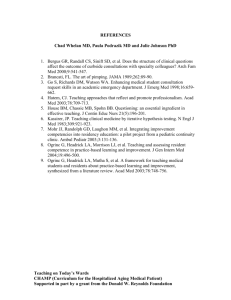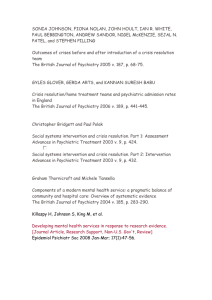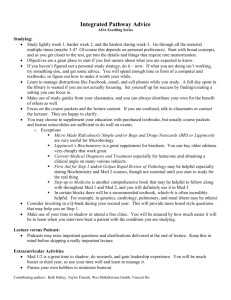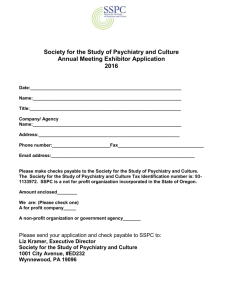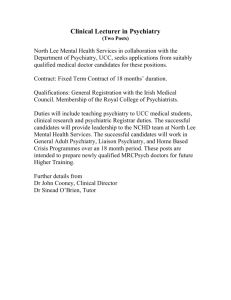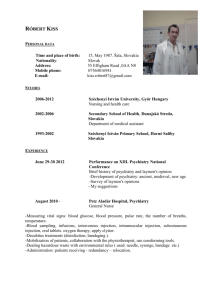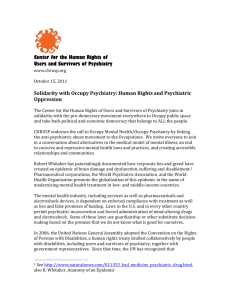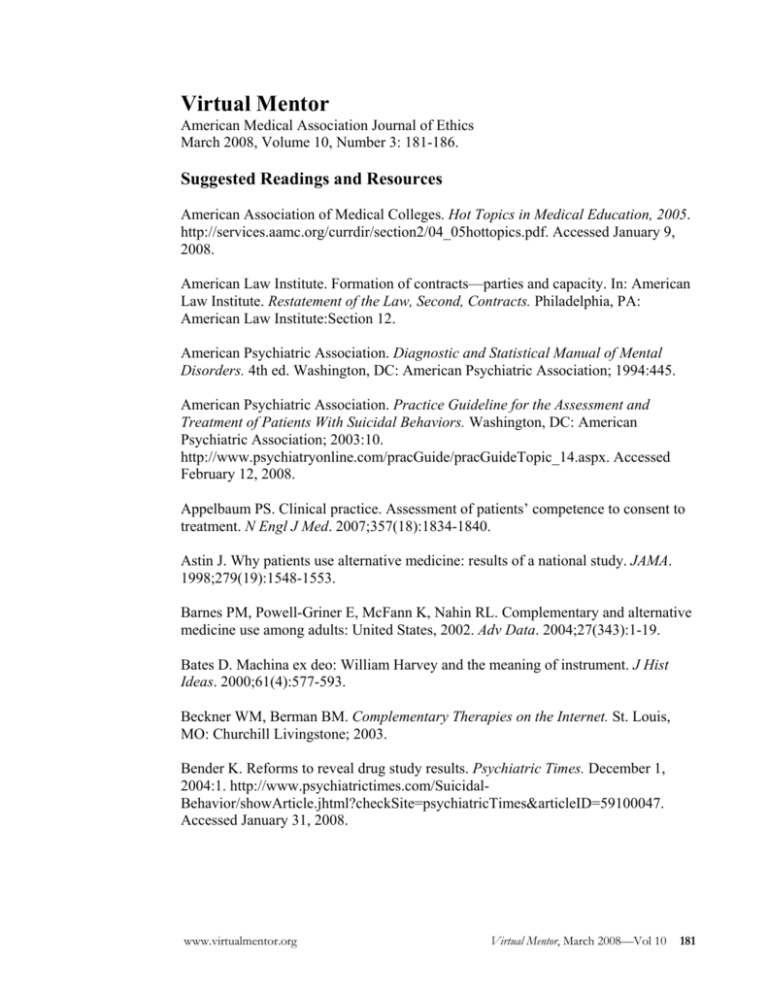
Virtual Mentor
American Medical Association Journal of Ethics
March 2008, Volume 10, Number 3: 181-186.
Suggested Readings and Resources
American Association of Medical Colleges. Hot Topics in Medical Education, 2005.
http://services.aamc.org/currdir/section2/04_05hottopics.pdf. Accessed January 9,
2008.
American Law Institute. Formation of contracts—parties and capacity. In: American
Law Institute. Restatement of the Law, Second, Contracts. Philadelphia, PA:
American Law Institute:Section 12.
American Psychiatric Association. Diagnostic and Statistical Manual of Mental
Disorders. 4th ed. Washington, DC: American Psychiatric Association; 1994:445.
American Psychiatric Association. Practice Guideline for the Assessment and
Treatment of Patients With Suicidal Behaviors. Washington, DC: American
Psychiatric Association; 2003:10.
http://www.psychiatryonline.com/pracGuide/pracGuideTopic_14.aspx. Accessed
February 12, 2008.
Appelbaum PS. Clinical practice. Assessment of patients’ competence to consent to
treatment. N Engl J Med. 2007;357(18):1834-1840.
Astin J. Why patients use alternative medicine: results of a national study. JAMA.
1998;279(19):1548-1553.
Barnes PM, Powell-Griner E, McFann K, Nahin RL. Complementary and alternative
medicine use among adults: United States, 2002. Adv Data. 2004;27(343):1-19.
Bates D. Machina ex deo: William Harvey and the meaning of instrument. J Hist
Ideas. 2000;61(4):577-593.
Beckner WM, Berman BM. Complementary Therapies on the Internet. St. Louis,
MO: Churchill Livingstone; 2003.
Bender K. Reforms to reveal drug study results. Psychiatric Times. December 1,
2004:1. http://www.psychiatrictimes.com/SuicidalBehavior/showArticle.jhtml?checkSite=psychiatricTimes&articleID=59100047.
Accessed January 31, 2008.
www.virtualmentor.org
Virtual Mentor, March 2008—Vol 10
181
Bhandari M, Busse JW, Jackowski D, et al. Association between industry funding
and statistically significant pro-industry findings in medical and surgical randomized
trials. CMAJ. 2004;170(4):481-483.
Bourget D, Whitehurst L. Amnesia and crime. J Am Acad Psychiatry Law.
2007;35(4):469-480.
Buckley v Ritchie Knop, Inc. 838 NYS 2d 84, 86 (NY App Div 2007).
Callahan D. Principlism and communitarianism. J Med Ethics. 2003;29(5):287-291.
Cohen AM, Stavri PZ, Hersh WR. A categorization and analysis of the criticisms of
evidence-based medicine. Int J Med Inform. 2004;73(1):35-43.
Conrad LI, Neve M, Nutton V, Porter R, Wear A. The Western Medical Tradition:
800 BC to 1800 AD. Cambridge, UK: Cambridge University Press; 1995:16.
Damasio AR. Descartes’ Error: Emotion, Reason, and the Human Brain. New
York, NY: G.P. Putnam’s Sons; 1994:4.
Engelhardt HT Jr. The Foundation of Bioethics. 2nd ed. New York, NY: Oxford
University Press; 1986:104.
The Evidence-Based Medicine Working Group. Evidence-based medicine. A new
approach to teaching the practice of medicine. JAMA. 1992;268(17):2420-2425.
Fava G. Can long-term treatment with antidepressant drugs worsen the course of
depression? J Clin Psychiatry. 2003;64(2):123-133.
Fingarette H. Confucius: The Secular as Sacred. San Francisco, CA: HarperCollins
Publishers; 1972:34.
Fletcher J. Indicators of humanhood: a tentative profile of man. Hastings Cent Rep.
1972;2(5):1-4.
Frei R. Dearth of depression diagnoses seen among antidepressant users. CNS News.
2004;6(8):1, 11.
Gillon R. Medical ethics: four principles plus attention to scope. BMJ.
1994;309(6948):184-188.
Goldman GM. The tacit dimension of clinical judgment. Yale J Biol Med.
1990;63(1):47-61.
182 Virtual Mentor, March, 2008—Vol 10
www.virtualmentor.org
Greenberg PE, Kessler RC, Birnbaum HG, et al. The economic burden of depression
in the United States: how did it change between 1990 and 2000? J Clin Psychiatry.
2003;64(12):1465-1475.
Grisso T, Appelbaum PS. Assessing Competence to Consent to Treatment: A Guide
for Physicians and Other Health Professionals. New York, NY: Oxford University
Press; 1998.
Harris J. The Value of Life. London: Routledge; 1985:18.
Haynes RB. What kind of evidence is it that evidence-based medicine advocates
want health care providers and consumers to pay attention to? BMC Health Serv Res.
2002;2(1):3.
Haynes RB, Devereaux PJ, Guyatt GH. Clinical expertise in the era of evidencebased medicine and patient choice. Vox Sang. 2002;83(suppl 1):383-386.
Henry SG. Recognizing tacit knowledge in medical epistemology. Theor Med
Bioeth. 2006;27(3):187-213.
Henry SG, Zaner RM, Dittus RS. Viewpoint: moving beyond evidence-based
medicine. Acad Med. 2007;82(3):293.
Herbert PB. The duty to warn: a reconsideration and critique. J Am Acad Psychiatry
Law. 2002;30(3):417-424.
Herbert PB, Young KA. Tarasoff at twenty-five. J Am Acad Psychiatry Law.
2002;30(2):275-281.
Herman PM, Craig BM, Caspi O. Is complementary and alternative medicine (CAM)
cost-effective? A systematic review. BMC Complement Altern Med. 2005;2(5):11.
Hinton M, Melonas J. Limiting your risks when prescribing SSRIs. Psychiatric
News. October 15, 2004:28. http://pn.psychiatryonline.org/cgi/content/full/39/20/28.
Accessed January 31, 2008.
Hollon SD, DeRubeis RJ, Shelton RC, Weiss B. The emperor’s new drugs: effect
size and moderation effects. Prevention and Treatment. July 15, 2002.
http://journals.apa.org/prevention/volume5/toc-jul15-02.htm. Accessed February 7,
2008.
Hudson RP. Disease and Its Control. Westport, CT: Praeger; 1983:78.
In the Matter of Agnes D. Rick (Del Ch, No 6920, 1994 WL 148268).
www.virtualmentor.org
Virtual Mentor, March 2008—Vol 10 183
Jha SR. The tacit-explicit connection: Polanyian integrative philosophy and a NeoPolanyian medical epistemology. Theor Med Bioeth. 1998;19(6):547-568.
Keitner GI, Ryan CE, Solomon DA. Realistic expectations and a disease
management model for depressed patients with persistent symptoms. J Clin
Psychiatry. 2006;67(9):1412-1421.
Kirsch I, Moore TJ, Scoboria A, Nicholls SS. The emperor’s new drugs: an analysis
of antidepressant medication data submitted to the U.S. Food and Drug
Administration. Prevention and Treatment. July 15, 2002.
http://journals.apa.org/prevention/volume5/toc-jul15-02.htm. Accessed February 7,
2008.
Kirschner KL. When written advance directives are not enough. Clin Geriatr Med.
2005;21(1):193-209.
Kothari S, Kirschner KL. Decision-making capacity after brain injury: clinical
assessment and ethical implications. In: Zasler N, Zafonte R, Katz D, eds.
Neurorehabilitation of Traumatic Brain Injury. 2nd ed. New York, NY: Demos
Publishing; 2007:1205-1222.
Liang SM. Chung-kuo wen hua yao-i (The Essential Features of Chinese Culture).
Hong Kong: Chi-cheng T’u-Shu Kung-Hsu; 1974.
Loukas M, Tubbs RS, Louis RG Jr, Pinyard J, Vaid S, Curry B. The cardiovascular
system in the pre-Hippocratic era. Int J Cardiol. 2007;120(2):145-149.
Mancano M, Bullano MF. Meta-analysis: methodology, utility, and limitations. J
Pharm Pract. 1998;11:239-250.
May C, Rapley T, Moreira T, Finch T, Heaven B. Technogovernance: evidence,
subjectivity, and the clinical encounter in primary care medicine. Soc Sci Med.
2006;62(4):1022-1030.
Mesulam M-M. Principles of Behavioral and Cognitive Neurology. 2nd ed. New
York, NY: Oxford University Press; 2000.
Moncrieff J, Wessely S, Hardy R. Active placebos versus antidepressants for
depression. Cochrane Database Syst Rev. 2004;1:CD003012.
Moran M. Drug prices rise twice as fast as rate of inflation. Psychiatric News.
August 20, 2004:18. http://pn.psychiatryonline.org/cgi/content/full/39/16/18-a.
Accessed January 31, 2008.
184 Virtual Mentor, March, 2008—Vol 10
www.virtualmentor.org
National Institutes on Aging. General information.
http://www.nia.nih.gov/Alzheimers/AlzheimersInformation/GeneralInfo/. Accessed
January 16, 2008.
R&D spending by US biopharmaceutical companies reaches a record of $55.2B in
2006 [press release]. Washington, DC: Pharmaceutical Research and Manufacturers
Association; Feb 12, 2007.
Reed K. When elders lose their cents: financial abuse of the elderly. Clin Geriatr
Med. 2005;21(2):365-382.
Rees L, Weil A. Integrated medicine. BMJ. 2001;322(7279):119-120.
Rudman S. Concepts of Person and Christian Ethics. Cambridge, UK: Cambridge
University Press; 1997:46-47.
Sackett DL, Rosenberg WM, Gray JA, Haynes RB, Richardson WS. Evidence based
medicine: what it is and what it isn’t. BMJ. 1996;312(7023):71-72.
Sadock BJ, Sadock VA. Kaplan and Sadock’s Synopsis of Psychiatry: Behavioral
Sciences, Clinical Psychiatry. 9th ed. Baltimore, MD; Williams & Wilkins; 2002.
Singer P. Practical Ethics. 2nd ed. New York, NY: 1993:83.
Spraycar M, ed. PDR Medical Dictionary. Baltimore, MD: Williams and Wilkins;
1995:1335.
Sussman N. The “file-drawer” effect: assessing efficacy and safety of
antidepressants. Prim Psychiatry. 2004;11(7):12.
Tanenbaum S. Getting there from here: evidentiary quandaries of the US outcomes
movement. J Eval Clin Pract. 1995;1(2):97-103.
Tao J. The moral foundation of welfare in Chinese society: between virtues and
rights. In: Becker GK, ed. Ethics in Business and Society: Chinese and Western
Perspectives. Hong Kong: Springer; 1997:9-24.
Tarasoff v The Regents of the University of California, 551 P2d 334 (Cal 1976).
Tarasoff v The Regents of the University of California, 529 P2d 553 118, Cal Rptr
129 (Cal 1974), at 561.
Thase ME. Antidepressant effects: the suit may be small, but the fabric is real.
Prevention and Treatment. July 15, 2002.
http://journals.apa.org/prevention/volume5/toc-jul15-02.htm. Accessed February 7,
2008.
www.virtualmentor.org
Virtual Mentor, March 2008—Vol 10 185
Thornton T. Tacit knowledge as the unifying factor in evidence based medicine and
clinical judgment. Philos Ethics Humanit Med. 2006;1(1):2.
Tindle HA, Davis RB, Phillips RS, Eisenberg DM. Trends in use of complementary
and alternative medicine by US adults: 1997-2002. Altern Ther Health Med.
2005;11(1):42-49.
Tooley M. The criterion of awareness of self as a continuing entity. In: Brody BA,
Engelhardt HT Jr, eds. Bioethics: Reading and Cases. Upper Saddle River, NJ:
Prentice Hall; 1987:146-152.
Tsai DF. How should doctors approach patients? A Confucian reflection on
personhood. J Med Ethics. 2001;27(1):44-50.
Tu WM. Confucian Thought: Selfhood as Creative Transformation. Albany, NY:
SUNY Press; 1985:113.
Turner EH, Matthews AM, Linardatos E, Tell RA, Rosenthal R. Selective
publication of antidepressant trials and its influence on apparent efficacy. N Engl J
Med. 2008;358(3):252-260.
Walters JW. What is a Person: An Ethical Exploration. Urbana, IL: University of
Illinois Press; 1997.
Weiner JR. Tarasoff warnings resulting in criminal charges: two case reports. J Am
Acad Psychiatry Law. 2003;31(2):239-241.
Weller EB, Kang J, Weller RA. Clinical perspective on pediatric depression: how the
evidence tipped SSRIs’ risk-benefit balance. Current Psychiatry. 2004;3(10):15-18.
Weinstock R, Vari G, Leong GB, Silva JA. Back to the past in California: a
temporary retreat to a Tarasoff duty to warn. J Am Acad Psychiatry Law.
2006;34(4):523-528.
Weisz G. The emergence of medical specialization in the nineteenth century. Bull
Hist Med. 2003;77(3):544.
Wilson A. Porter versus Foucault on the ‘Birth of the Clinic.’ In: Bivins R, Pickstone
JV, eds. Medicine, Madness, and Social History. New York, NY: Palgrave
Macmillan; 2007:32.
Copyright 2008 American Medical Association. All rights reserved.
186 Virtual Mentor, March, 2008—Vol 10
www.virtualmentor.org

